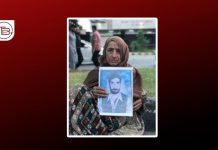Ehsan Mir
According to Bruce B. Campbell’s book “Death Squads in Global Perspective: Murder with Deniability,” death squads are covert, often irregular, and paramilitary organizations that carry out extrajudicial executions, targeting specific individuals or groups of people. They are also involved in other heinous crimes such as enforced disappearances, torture, rape, arson, and bombings. Their primary, and sometimes sole, objective is murder.
In Balochistan, there are multiple state-sponsored local militias or death squads operating with the aim of suppressing state opponents and eliminating individuals and groups critical of state policies. These militias operate freely with the approval of the Establishment.
The largest province of Pakistan has been embroiled in a two-decade-long conflict between Baloch nationalist organizations and the Pakistani state. In this complex situation, the Baloch people accuse the state of being involved in indiscriminate killings of political dissidents through death squads. Human rights organizations, journalists, and other political figures in Pakistan have reported numerous cases of enforced disappearances, extrajudicial killings, and torture. The impunity enjoyed by these death squads is a testament to the audacity with which they operate in Balochistan.
According to a report by DAWN, Shafiq Mengal, the son of former federal minister Naseer Mengal, established the Baloch Musallah Difaee Tanzeem (MDT), a pro-establishment tribal militia, in the second half of 2008. However, the militia quickly transformed into a death squad that targeted and murdered individuals based on their political and tribal affiliations. Many believe that Shafiq Mengal was used as a pawn by intelligence agencies to counter Baloch militants in the province.
On January 25, 2014, in Tootak, Balochistan, three mass graves were discovered in close proximity to Mr. Shafique Mengal’s residence. The shocking discovery of one of these graves by a shepherd raised deep concerns among the Asian Human Rights Commission (AHRC). The individuals buried there were alleged to be Baloch missing persons who had been abducted and extrajudicially killed.
Additionally, the Balochistan National Party organized several protests and rallies across the province, accusing Shafiq Mengal of involvement in the enforced disappearances of Baloch citizens.
The existence of death squads in Balochistan poses a grave threat to the people of Balochistan and the overall security of the region. This humanitarian issue demands serious attention from international human rights organizations. The monopoly and impunity enjoyed by these death squads must be brought to an end. Balochistan cannot progress towards a peaceful and inclusive future without thorough and transparent investigations, accountability, and respect for human rights.
Disclaimer: The views and opinions expressed in this article are those of the author and do not necessarily reflect the official policy or position of The Balochistan Post or any of its editors.






























